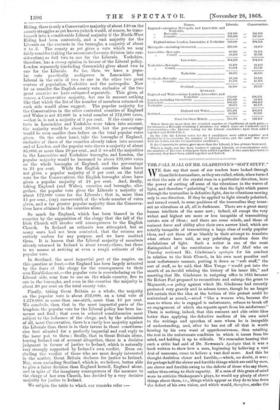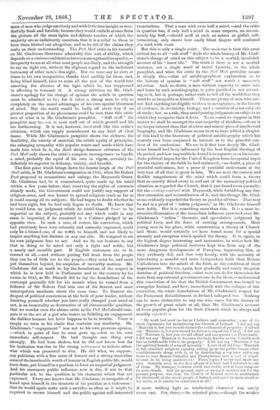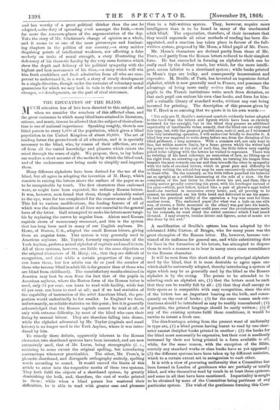THE PILL MALL ON MR. GLADSTONE'S "SOFT STUFF."
WE dare say that most of our readers have looked through those little tourmalines, as they are called, which, when turned so that the axis of the crystal runs in a particular direction, have the power of cutting off some of the vibrations in the waves of light, and therefore " polarizing" it, so that the light which passes through the tourmaline is defective light, due to vibrations moving only in one direction. If they be applied to light already polarized, and turned round, in some positions of the tourmaline they trans- mit no vibrations at all, all is darkness& There are a great many human intellects of the same sort ; indeed, all except the very widest and highest are more or less incapable of transmitting certain sets of ideas ; and there are some minds, and those of eminent force and ability after their own narrow kind, which are notably incapable of transmitting a large class of really popular ideas, and cut them off as blankly in their attempt to translate what others have said, as any polarizing medium does the undulations of light. Such a writer is one of the most distinguished of the contributors to the Pall Mall who on Tuesday reviewed Mr. Gladstone's apologia for his conduct in relation to the Irish Church, iu his own most peculiar and most unfortunate manner, putting it down as "soft stuff," the sort of stuff, as he said, that Miss Yonge " would put into the mouth of an invalid relating the history of his inner life," and asserting that Mr. Gladstone in resigning office in 1845 because Sir Robert Peel proposed to reconstitute and enlarge the grant to Maynoot11,-a policy against which Mr. Gladstone had recently protested very gravely and in solemn terms, though he no longer felt certain that the idea at the bottom of this protest could be maintained as sound,-acted " like a woman who, because the man to whom she is engaged is unfortunate, refuses to break off an engagement of which she repents apart from his misfortune." There is nothing, indeed, that this eminent and able critic likes better than applying the defective medium of his own mind to the writings and speeches of men whom he is incapable of understanding, and, after he has cut off all that is worth hearing by his own want of apprehensiveness, then retailing the rest in the unfortunate condition in which it issues from his wind, and holding it up to ridicule. We remember hearing that such a critic had said of Dr. Newman's Apologia that it was a book written to show how a man, beginning by believing a vast deal of nonsense, came to believe a vast deal more. And this he thought doubtless clever and forcible,-which, no doubt, it was ; for perhaps half the clever and forcible things which are said by men, are clever and forcible owing to the defects of those who say them, rather than owing to their capacity. If a man of this grain of mind were to criticize Shakespeare's plays, he would say plenty of clever things about them, i.e., things which appear as they do to him from the defect of his own vision, and which would, therefore, strike the mass of men who judge carelessly and with little true insight as won- derfully fresh and forcible, because they would exclude at once from the picture all the cross lights and delicate touches of which the majority are so indistinctly conscious that it is a relief to them to have them blotted out altogether, and to be rid of the claims they make on their understanding. The Pall Mall critic in his remarks on Mr. Gladstone illustrates admirably this sort of ability, which depends on a curious combination between strength and incapacity,— incapacity to see at all what most people see dimly, and the strength to say so, right out, without the slightest regard to the indistinct testimony of other men's dim sight. But we must say he riots at times in his own iucapacities, thanks God audibly for them, and, being blind himself, tries to scare all the rest of the world into asserting the absence of the light which he has suppressed in affecting to transmit it. A strong criticism on Mr. Glad- stone's apology for his change of opinion the article in question must be admitted to be ; for it takes a strong man to rely so completely on the moral advantages of his own special bluntness of mind. But the world would be badly off every way if no greater proportion of its phenomena could be seen than this critic sees of what is in Mr. Gladstone's pamphlet. " Soft stuff" the pamphlet may be,—so is most stuff out of which growth and life are forthcoming. It is not, however, hard stuff like this critic's criticism, which can supply nourishment to any kind of ideal tissue. While Mr. Gladstone's pamphlet shows the richness, the flexibility, the variety of material, the subtle equity of principles, the enlarging sympathy with popular wants and needs which have made him what he is, the dead sledge-hammer criticism of the Pall Mall only shows the critic's complete incompetence to handle a mind, probably the equal of his own in vigour, certainly in- definitely its superior in delicacy, variety, and breadth.
The first point which brings down the hoarse laugh of the Pall Mall critic, is Mr. Gladstone's resignation in 1845, when Sir Robert Peel proposed to reconstitute and enlarge the Mayuooth Grant. Mr. Gladstone had, be it remembered, quite made up his mind within a few years before, that, reserving the rights of contracts already made, the Government could not justify any support of religious error, and was bound to spread religious truth as far as it could among all its subjects. He had begun to doubt whether he had been right, but he had only begun to doubt. He knew that he could form no judgment which he could himself know to be impartial on the subject, probably not any which could in any sense be impartial, if he remained in a Cabinet pledged to an opposite view. In such a case, of course, his conviction, which had previously been very solemnly and earnestly expressed, could only be a biassed one, of no worth to himself, and not likely to inspire anything but distrust in any one else. He resigned to set his own judgment free to act. And we do not hesitate to say that in doing so he acted not only a right and noble, but a manly and sensible part. If English statesmen are to be trusted at all,—and without getting full trust from the people they can be of little use to the people,—they must be, and must put themselves beyond, the suspicion of unworthy motives. Mr. Gladstone did as much to lay the foundations of the respect in which he is now held in Parliament and in the country by his course in 1845, as Mr. Disraeli did to lay the foundations of the contempt generally felt for his morale when he turned from a follower of Sir Robert Peel into one of his fiercest and most unscrupulous assailants about the same time. To disavow the deepest of political convictions at the beck of your leader, without knowing yourself whether you have really changed your mind or not, is an immorality so destructive of all statesmanlike qualities, that we wonder even the obtuse critic in the Pall Mall should com- pare it to the act of a girl who insists on fulfilling an engagement she dislikes because her lover happens to be in trouble. There is simply no term in his simile that contains any similarity. Mr. Gladstone's "engagement" was not to his own previous opinion, —which in point of fact he soon gave up,—but to his own immediate self-respect. He had thought one thing very strongly. He had been shaken, but he did not know bow far his hesitation was due to the strong inducement to believe other- wise which was presented to him. He did what, we suppose, any politician with a fine sense of honour and a strong masculine senseof the inestimable worth of honour in English public life, would have done, put himself in a position to form an impartial judgment. And his enormous public influence now is due, if not to that particular act, to the qualities in his character which that act expressed. Every one knows that Mr. Gladstone is incapable of a fraud upon himself in the interests of his position as a statesman ; that he would again make such a sacrifice as often as it might be required to secure himself and the public against self-interested
recantations. That a man with even half a mind,—and the critic in question has, if only half a mind in some respects, an uncom- monly big half,—should scoff at such an action as girlish self- tormenting, only shows how easily blunt fingers will confound
fine cord with weak.
But this is only a single point. The main one is that this great critical foe to all "soft stuff " finds the whole history of Mr. Glad- stone's change of mind on this subject to be a morbid, invalidish account of his " inner life." The truth is there is not a morbid sentence, not a single word of moral hysteria, in the whole pamphlet, and what the critic in the Pall Mall probably means- is simply this,—that all autobiographical explanation as to
the history of opinion is "soft stuff" not worth a moment's attention. And, no doubt, a man without capacity to enter into and learn by such autobiography, is quite justified in not attend- ing to it, but is, perhaps, rather rash to tell all the world that they must be as incapable as himself. There are plenty of men who can- not find anything intelligible to them in metaphysics, in the theory of evidence, in electricity, biology, and a number of other subjects of study; but, as a rule, they avoid passing judgments on subjects on which they recognize their defects. To us,—and we suppose in this matter we shall be amongst the vast majority of thinkers,—there is no deeper interest than that of a true and minute piece of intellectual biography, and Mr. Gladstone seems to us to have added a chapter of this kind to the literature of political autobiography which has scarcely ever been surpassed in interest as in the graceful can- dour of its confessions. We see in it first how deeply Mr. Glad- stone himself had been influenced by the best English theology of theperiod, and how impossible he found it to separate even his imme- diate political hopes for the United Kingdom from his special hopes for the victory of the faith lie had embraced,—no doubt, a piece of youthful enthusiasm, but a piece of youthful enthusiasm at the very root of all that is great in him. We see next the curious and flexible sanguineness of the mind which could form a theory
that so exactly fitted every in and out of the momentary political situation as regarded the Church, that it just found room (morally) for the existing contract with Maynooth, while forbidding any fur-
ther extension and reconstitution of it, and this though Mr. Glad- stone evidently regarded the theory as good for all time. That may be and is a proof of " infirm judgment," as Mr. Gladstone himself now holds. But it is something more than this. It is a most in- structive illustration of the immediate influence exercised over Mr. Gladstone's " infirm " theoretic and speculative judgment by political facts, and the force of existing arrangements. Most
young men in his place, while constructing a theory of Church. and State, would certainly not have found room for a special anomaly and exception which spoiled the theory. It is, again, in the highest degree interesting and instructive, to notice how Mr.
Gladstone's large political instincts kept him from any of the more dangerous developments of Puseyism, impressing him, as they evidently did, and that very keenly, with the necessity of introducing a sounder and more independent faith than Roman
Catholicism into the minds of the Irish, as the condition of their improvement. We see, again, how gradually and surely the great doctrine of political freedom,—that men can do for themselves far more than any external government can do for them,—undermined this conviction of his that the British Government was bound to
evangelize Ireland, and how, immediately with the collapse of this conviction, the whole foundations of Mr. Gladstone's respect for the Protestant Establishment in Ireland collapsed too. Nothing can be more instructive to any one who carts for the history of the growth of great minds at all, than Mr. Gladstone's account
of those popular pleas for the Irish Church which he always and steadily rejected :— " My work had used (as far as I believe and remember) none of the stock arguments for maintaining the Church of Ireland. I did not say Maintain it, lost you should disturb the settlement of property.' I did not say Maintain it, lest you should be driven to repeal the Union.' I did not say Maintain it, lost you should offend and exasperate the Protestants.' I did not say Maintain it, because the body known as the Irish Church- has an indefeasible title to its property.' I did not say Maintain it for the spiritual benefit of a small minority.' Least of all did I say Maintain it, but establish religious equality, setting up at the public charge other establishments along with it, or by distributing a sop hero and a sop there to coax Roman Catholics and Presbyterians into a sort of acqui- escence in its being maintained.' These topics I never had made my own. Scarcely ever, in the first efforts of &bate, had I referred to one of them. My trumpet, however shrill and feeble, had at least rung out its note clearly. And my ground, right or wrong it matters not for the present purpose, was this : the Church of Ireland must be maintained for the benefit of the whole people of Ireland, and must be maintained as the truth, or it cannot be maintained at all."
A more striking light on intellectual character was surely never cast. For, these,—the rejected pleas,—though far weaker
and less worthy of a great political thinker than the one he adopted,—the duty of spreading truth amongst the Irish,—were far more the common-places of the argumentation of the day. Take the story of Mr. Gladstone's change of opinion as a whole, and it seems to us one of the most picturesque and fascinat- ing chapters in the politics of our country,—a story neither disguising points of intellectual weakness, nor affecting a false modesty on traits of moral strength, a story illustrating the deficiency of his theoretic faculty by the very same features which show the depth and delicacy of his political sympathy with the highest and best movements of his time,—a story which will win him fresh confidince and fresh admiration from all who are com- petent to understand it, in a word, a story of steady development in a single direction, though under the restraint of voluntary moral guarantees for which we may look in vain in the account of other changes, not developments, on the part of rival statesmen.








































 Previous page
Previous page